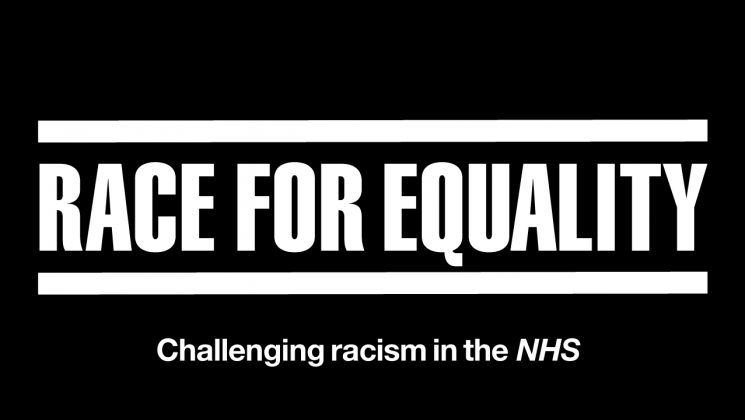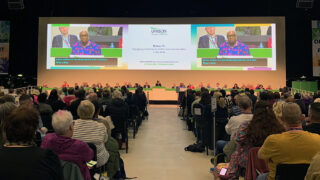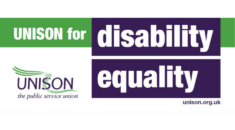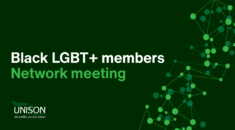The names of the branch and members mentioned in this article are anonymous, in order to protect individuals
Generations of Black staff have helped make the NHS what it is today. Yet every day, many face discrimination at work – whether it’s being overlooked for promotion, finding themselves more likely to be disciplined than their white colleagues, or having to endure racial abuse and workplace segregation.
On top of that, when a Black member does have the courage to report an incident, it’s more than likely ignored – and they’re the one deemed to be a troublemaker.
The Race for Equality campaign seeks to remedy those injustices. The aim is to support staff – and help them support each other – as we work together to take on racism.
UNISON deputy head of health Helga Pile says: “Obviously, some of the abuse we’re hearing about has been unleashed by Brexit. But racism in the NHS has been a persistent problem for years.
“Employers across the NHS are, in theory, signed up to doing something about race equality. But commitments at the top don’t necessarily translate into action in workplaces.
“We want this campaign to demonstrate that UNISON is serious about pushing for real change, to create an environment where people experiencing racism at work come to the union much earlier than they do currently.”
To that end, the union has put together a package of materials designed to help health branches get more active in this area, so they can organise collectively around race issues as well as respond to individual case work.
“It’s about making sure Black members are fully involved and have a voice within the branch and with the employer,” adds Ms Pile. “But it’s also about starting conversations with everyone in the workplace, including those who aren’t aware of what is happening to their colleagues, or don’t believe there are problems, or may themselves be part of the problem.”
Racism in numbers
- 19% of the workforce are Black, but only 7% of senior managers are Black;
- 15% of Black staff experience discrimination at work – double the rate reported by white staff;
- White applicants are 1.45 times more likely to be appointed from shortlisting than Black applicants;
- Black staff are 1.24 times more likely to enter formal disciplinary processes;
- 28% of Black staff experienced harassment, bullying or abuse from staff in the last 12 months, compared with 23% of white staff;
- Only 72% of Black staff believe their employer provides equal opportunities for career progression/promotion, compared with 87% of white staff.
Data from the NHS workforce race equality standard 2018
One branch that is working hard in this area, in the Northern region, represents hundreds of members across numerous sites in a large health trust.
Two years ago, its branch chair conducted a number of focus groups with Black members, in partnership with the trust and the Northern region’s Black members’ group.
While they found no striking problems regarding adverts, job interviews, inductions and training, there were significant reports of racial discrimination in workplaces.
“That’s where issues started to be raised with us,” she says, with members adding that complaints made to managers invariably fell on deaf ears.
From there things moved fast, driven by the branch chair’s desire to impress all staff with a clear message: “It’s not enough to be non-racist. We need to be robustly anti-racist.”
The region funded a day’s training from Show Racism the Red Card (SRtRC) for Black and white staff at a certain site. The trust has since agreed to fund more sessions itself. Branch reps have also had SRtRC training with the aim of making them feel more confident about identifying and challenging racism and speaking to members about the issues.
It’s their word against mine. What are going to be the consequences, for me, if I report somebody?
At the same time, some Black members were coming forward not just with their grievances, but with a desire to become more involved in the union.
One such was Lucy, who became the branch’s Black members’ officer in May.
“Black people can go through all sorts of discrimination in the workplace,” she says.
“What I’ve picked up very quickly is the fear of reporting it. They’re thinking: ‘It’s their word against mine. What are going to be the consequences, for me, if I report somebody? I need to feed my family.’ So they tend to just keep it to themselves.
“Unfortunately, what happens is we have cultures and values that are different to our white counterparts and the way we respond to situations is also different.
“Maybe someone has endured so much that the only way to deal with it is to shout. And then people say he or she is very aggressive.”
Lucy had a couple of experiences in which she felt she was being treated differently because she was Black. One involved a rejected request for exceptional leave to visit her parents in Nigeria, who she hadn’t seen for nine years – yet other members of staff were being granted such leave.
This prompted her to seek out the regional Black members’ group and become more active.
And now she’d like to establish a similar group at her branch. “I’m hoping to get more Black members involved, to have regular meetings, to discover what’s happening to people in different areas, because actually we don’t know.
“It would be a place where people can express themselves without thinking about the consequences, with others who you see have similar experiences to yourself. There’s nothing like having another person who relates to what you’re going through.”
The way I was being treated was very inappropriate and racist. It affected me to such an extent that I broke down
Two others who have been driven by their own experiences to become active are Martin, who is a UNISON rep, and Veronica, who’s in the process of becoming one.
A few years ago, Martin was in his final placement of nurse training, the only African in his group. After a positive start, suddenly no-one would talk to him. If he tried to delegate some work to a junior member of staff, they would just completely ignore him. He felt increasingly isolated.
“The way I was being treated was very inappropriate and racist,” he says. “It affected me to such an extent that I broke down. I couldn’t carry on.” As a result, he didn’t finish his training.
“If I had let them know the way I was suffering in silence, perhaps things could have changed,” he reflects now. “But my worry was that if I let them know, it will backfire. These are the people who are actually responsible for my being able to complete my course.
“That was before I joined UNISON. If I had already been a member then things would have been different. I would have known how to challenge it.”
Veronica talks of the alienation she too endured in one workplace.
“If people are talking and you join them, everybody goes silent. If they are planning to go for a meal or something, you won’t hear about it. If they are collecting money on the ward for someone, maybe someone who is ill, you will not hear it.
“You are just there, but you are not there. This is torture. I was on anti-depressants because I couldn’t cope. I cried day and night.”
Veronica equates her experience to segregation. “They have this clique. It might be four in this group, six in this group – and nobody will be able to penetrate through them. If anything happens, you cannot get any good evidence, because they support each other.”
UNISON’s regional head of health in the north east, Helen Coomer, says: “UNISON is working proactively with our regional Black members group, health branches and health trusts to tackle racism in the workplace. We are engaging with employers to ensure there are robust policies in place.
“We are also working with Show Racism the Red Card, which will undertake equality training.”
I’m trying to say ‘enough is enough’. I need to be who I am
In the meantime, the effort to engage and represent Black members continues, she says.
“The word’s out that UNISON will do something about this if you contact them. Lucy, Martin, Veronica and some of our other Black members have been brilliant ambassadors for that. They’ve gone out to workplaces and said to people: ‘Do something, say something, here are their phone numbers, ring them. They’ll take you seriously.’ So we are hearing from more and more people.”
Everyone agrees that to better facilitate that, work is also needed to overcome negative perceptions by Black members of the union itself, which are entirely understandable given their circumstances.
Says Lucy: “Initially I was thinking to myself: ‘They can’t do anything for me. Why will white be different to the white that is treating me [badly] in the workplace?’ That kind of attitude. But coming closer to the union, I can see they are different.
“And then being a member of the union opens so many things that you can’t even imagine – being aware of social integration in society, coming together in multicultural ways, white, Black, Asian – everybody mixing together and learning from each other.”
All branches can do more to inform their Black members of what the union can offer them.
As Martin puts it: “Disseminating this knowledge to our Black community will give them the confidence, the reassurance that, if they see racism happening in the workplace, they can report it and it will be dealt with accordingly.”
For Veronica the key factor in her branch’s progress has been that more Black members are deciding to learn about the union and working to support each other.
“It’s now that I’m trying to say ‘enough is enough’. I need to be who I am.”
Find out more about what UNISON is doing to support Black staff in the NHS and tackle the issue of racism, at the campaign webpage





